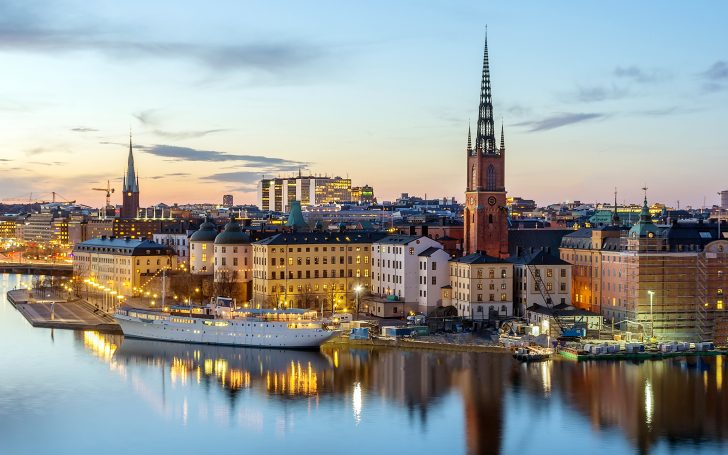Stockholm, the capital of Sweden, is a modern Scandinavian city with contemporary architecture and substantial historical, cultural and economic significance.
The inner city of Stockholm consists of 14 islands connected by some 50 bridges on Lake Mälaren, which flows into the brackish Baltic Sea.
What is special about the city of Stockholm is its natural parts: namely, over 30% of the city area is made up of waterways, and another 30% is made up of green spaces.
This, naturally, leads to this city has an extremely high quality of air – in fact, air quality in Stockholm is fourth-best of the European capitals – behind Zurich, Copenhagen, and Vienna.
And though Sweden’s pride isn’t the modern cities and contemporary architecture that Stockholm has to offer, its gorgeous natural beauty, this city offers many tourist attractions that you should set aside at least ten days to visit them all.
Warnings & Dangers in Stockholm

OVERALL RISK: LOW
Stockholm is a very safe city to visit, but that doesn't mean you should let your guard down: crime has been on the rise since the '80s and petty crime exists in most countries in the world, so exercise caution at all times.

TRANSPORT & TAXIS RISK: LOW
Taxis and other means of transportation are very safe and reliable in Stockholm.

PICKPOCKETS RISK: MEDIUM
There is some risk of pickpockets, mostly around tourist landmarks and crowded places such as bus and train stations, airports or shopping centers. Avoid flashing your valuables in public, or leaving them in plain sight and that should minimize the risk of someone stealing from you.

NATURAL DISASTERS RISK: MEDIUM
When it comes to natural disasters, there are some risks, mostly connected to the fact that, during winter, this city is below freezing point. Dress accordingly and expect snowstorms and extremely cold temperatures.

MUGGING RISK: LOW
Mugging is uncommon in Stockholm, and so is kidnapping. However, as in any city, it is recommended that you remain vigilant at all times. Be wary of people trying to distract you, as it might be a trick to try to steal from you.

TERRORISM RISK: MEDIUM
There haven't been any terrorist attacks in Stockholm's recent history. However, in the light of recent events and terrorist attacks in Europe, they shouldn't be ruled out, so remain aware of your surroundings at all times.

SCAMS RISK: MEDIUM
As in most cities of the world, there will always be people trying to scam unsuspecting tourists. The risk of scammers is not too high, but you should still double-check everything. Be wary of people offering you help with anything or giving you unsolicited advice or directions.

WOMEN TRAVELERS RISK: LOW
Stockholm is generally safe for women traveling solo, except in some parts of it, such as Rinkeby, after dark. Just follow the rules of common sense such as avoiding deserted and poorly lit streets and areas, and your trip should go smoothly.
So... How Safe Is Stockholm Really?
Stockholm is generally very safe to visit, even though since the ’80s crime rates have steadily been on the rise, so watch out when walking the streets of Stockholm especially at night and during weekends.
There are also areas to be avoided such as Rinkeby, with violent crimes and robberies being more and more common.
If you see a street fight, just keep a safe distance and never get involved in one.
There have been reports of young people being injured or even killed after trying to intervene in a street fight.
Young people, usually when drunk or otherwise intoxicated are a real threat in this country, so it is best to avoid them.
Never argue with security guards or bouncers since they are legally allowed to use force if needed and they will use that legal power against you.
Generally, Swedes are known to avoid eye contact, especially in dangerous or uncomfortable situations, so avoid looking them directly in the eyes as it might provoke them if such a situation presents itself.
As for pickpockets, they do operate, but it isn’t a serious issue in this city.
They usually operate in tourist-frequented areas and crowded places such as airports, bus and train stations, and shopping areas.
Most Swedes feel comfortable carrying their cash with them but still exercise caution.
Also, if you’re using bicycles, lock them safely before moving away.
How Does Stockholm Compare?
| City | Safety Index |
|---|---|
| Stockholm | 78 |
| Lund | 92 |
| Malmo | 82 |
| Gothenburg | 78 |
| Deadwood (United States) | 80 |
| Sturgis (United States) | 80 |
| Pierre (United States) | 81 |
| Spearfish (United States) | 80 |
| Hill City (United States) | 83 |
| Temuco (Chile) | 31 |
Useful Information

Visas
Most countries do not need a visa to enter Sweden, for any stays shorter than 90 days. Any longer than that, you might need to acquire a visa. Make sure your passport is valid for at least six months past your planned date of return. If you are not sure about your visa status, visit www.doyouneedvisa.com which will let you know whether or not you need a visa based on your nationality and the country you want to visit.

Currency
Swedish Krona is the official currency in Stockholm. As most Scandinavian cities, Stockholm is expensive so plan on spending around 130 euro per day. ATMs are widely available throughout the country and credit cards are accepted in most establishments such as hotels and restaurants. Tipping is rare.

Weather
Stockholm generally has a relatively mild climate compared to other Scandinavian cities. Temperatures in July are between 13 and 17°C. February is usually Sweden's coldest month, with temperatures dropping as low as - 22°C.

Airports
Stockholm Arlanda Airport is Sweden's busiest airport located in the Sigtuna Municipality of Sweden, around 37 kilometers north of Stockholm.

Travel Insurance
Just like anywhere else, we recommend getting travel insurance when traveling to Stockholm, since it covers not only the costs of medical problems but also theft and loss of valuables.
Stockholm Weather Averages (Temperatures)
Average High/Low Temperature
| Temperature / Month | Jan | Feb | Mar | Apr | May | Jun | Jul | Aug | Sep | Oct | Nov | Dec |
|---|---|---|---|---|---|---|---|---|---|---|---|---|
| High °C |
1 | 1 | 5 | 11 | 16 | 20 | 24 | 22 | 17 | 10 | 6 | 2 |
| Low °C |
-3 | -3 | -1 | 3 | 7 | 11 | 15 | 14 | 10 | 6 | 2 | -2 |
| High °F |
34 | 34 | 41 | 52 | 61 | 68 | 75 | 72 | 63 | 50 | 43 | 36 |
| Low °F |
27 | 27 | 30 | 37 | 45 | 52 | 59 | 57 | 50 | 43 | 36 | 28 |
Sweden - Safety by City
| City | Safety Index |
|---|---|
| Gothenburg | 78 |
| Lund | 92 |
| Malmo | 82 |
| Stockholm | 78 |












Not to bad
Havent been back to Sweden for several years. Spent several days in Stockholm and visited Malmo (on business). Like so many European cities, the Europeans were very helpful and no issues. It was so obvious that the migrants are the problem. Paris, London, Amsterdam and other cities around the world have the same issue with Africans, Romanians, Indians and Jamaicans. It is just to bad that these migrants have been able to create fear and mistrust wherever they show up.
It is obvious, when you look at the state of the world, that Europeans have been the problem, creating substance abuse, slavery, fear, indoctrination, mass incarceration, mistrust and poverty wherever they show up.
We are talking about Stockholm and I agree with Mike.
This is a big problem in the larger cities of Sweden.
That terrorism risk definitely needs an update.